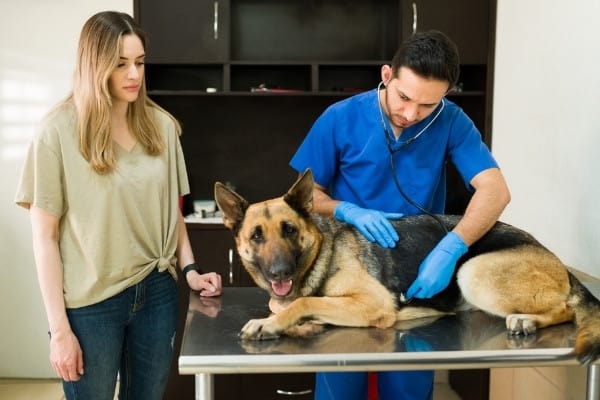
It’s upsetting when your dog isn’t feeling well, but there’s typically no need for alarm. Digestive upset is quite common in dogs, and it will usually pass quickly, often within 24 hours.
Of course, you want to help your pup recover quickly, but what can you do?
What do you give a dog for an upset stomach? Rest and small portions of bland, unseasoned, easily digested food, such as canned pumpkin, chicken, and rice, are often all that’s needed for a quick recovery. Ginger mixed with food can help too. Encourage him to drink small amounts of water frequently, and see a vet if symptoms persist or worsen.
Dogs are skilled at taking everything in stride, so chances are good that you are much more concerned about your dog’s stomach ache than he is.
As a dog owner, however, it’s your duty to do everything you can to get him back on track quickly, and that’s exactly what you’ll learn how to do in the following.
Home Remedies for Dogs With Upset Stomach
If you feel that you’re dealing with just a run-of-the-mill upset stomach and your vet has given the go-ahead for at-home care, the following tips, bland foods, and medications can help your dog feel better.
General Tips
Withhold Food
While a prolonged fast of 12 hours or more typically isn’t necessary for mild tummy aches, withholding food for a few hours will give your dog’s stomach a chance to settle and allow time for inflammation to diminish.
More severe tummy troubles may benefit from a 24-hour fast, but ask your vet first as this can be dangerous for certain dogs.
Reintroduce Food Gradually
Even after your dog seems to be feeling better, keep him on a bland diet for a day or two.
After that, slowly begin to incorporate his normal diet with the bland one a little at a time, increasing the amount each day until all is back to normal.
1. Keep Your Dog Hydrated
Remaining hydrated is always important, but if your dog is frequently vomiting or experiencing diarrhea, you’ll need to monitor his fluid intake and watch for signs of dehydration.
Signs include:
- Loss of skin elasticity.
- Dry mouth.
- Thick saliva.
- Decreased urination.
- Dark yellow, foul-smelling urine.
- Low energy.
- Sunken eyes.
Encourage him to drink every hour or so, but don’t let him drink too much at a time as this could cause him to vomit again, thus worsening the dehydration.
If you’re truly concerned that your dog is close to becoming dehydrated, give him Pedialyte (2-4 milliliters per pound of body weight) or a pet electrolyte supplement.
- Good For Agility and Hunting Dogs
- Replenishes Electrolytes
2. Give Your Dog a Few Hours To Recover on His Own
In many cases, a dog will feel better within an hour or two without any intervention, especially if he empties his stomach of the offending material.
It’s normal for dogs to eat grass when experiencing stomach upset.
It’s unclear as to whether they eat grass to soothe the stomach or induce vomiting, but make sure that any grass consumed has not been treated with pesticides or fertilizers.
Also know that dogs can pick up parasites when engaging in this behavior, so be sure to let your vet know that your pup has been grazing.
3. Ginger
Ginger is anti-inflammatory and very soothing to the stomach and digestive tract. It’s considered safe for dogs when given in small quantities.
Offer your dog a small portion of bland food with no more than 1 teaspoon of ginger mixed in.
4. Canned Pumpkin
Pumpkin is naturally full of nutrients and fiber and is known to ease digestion, diarrhea, and constipation. Only offer plain canned pumpkin, not the spiced variety.
The American Kennel Club recommends feeding only 1-4 tablespoons at a time, depending on your dog’s size.
5. Homemade Bone Broth

We’re not talking about the salt-laden cans from the store here but rather all-natural goodness made in your own kitchen from beef, turkey, chicken, duck, or rabbit bones.
Since it takes a while to make, make a large batch and freeze individual portions so it’s ready when you need it. To make:
- Place several bones in a slow-cooker and cover with water.
- Cook on low for 24 hours.
- Allow to cool.
- Remove and discard the solid fat that forms on top.
- Strain broth, and throw away bones.
- Divide into small portions (an ice cube tray is great for this!), and freeze.
- Store frozen portions in a sealable bag in the freezer.
6. Chicken
Boiled, boneless chicken with no seasonings is gentle on the tummy, full of protein and nutrients, and easy to digest. Shred or dice before feeding to prevent choking.
Cooked chicken can also be offered in conjunction with other bland food.
7. Rice
Cooked white rice can either be offered on its own or paired with a protein, like boiled chicken, or a bland, cooked vegetable.
Just be sure to leave out all seasonings, including salt and butter.
8. Bananas
Bananas are known to be gentle and soothing to the gastrointestinal tract and can be particularly helpful in bringing an end to episodes of diarrhea.
Mash or dice before serving, and don’t over do it as bananas are high in natural sugars.
9. Baby Food
Baby food is designed to be nutritious and gentle on the digestive system. Offer your dog meat-based varieties or bland options like banana, carrots, green beans, or sweet potatoes.
10. Sweet Potatoes
Sweet potatoes are similar to pumpkin in that they too work to calm stomach issues while providing a host of nutrients.
Cook thoroughly, don’t add any seasonings, and mash or cube before serving.
11. Probiotics
Probiotics are naturally occurring beneficial microbes that live within the gut. An imbalance of good and bad microbes can lead to a host of digestive issues, including an upset stomach.
To restore proper balance and ease stomach pain, try feeding plain, unsweetened yogurt with added probiotics or probiotic supplements made for dogs.
- Number one probiotic supplement recommended by veterinarians (Kantar Veterinary Tracker, 2020)
- Probiotic supplement for the dietary management of puppies and adult dogs with diarrhea
12. Oatmeal
Whole grain, unsweetened oatmeal prepared with water and without any salt or flavorings can be offered in moderation to help soothe stomach upset.
The AKC recommends no more than 1 tablespoon for every 20 pounds of weight.
13. Eggs
Eggs, either boiled or scrambled, are easy to digest, high in nutrients, and a favorite of many dogs. Be sure to chop them into small bites to ensure your dog doesn’t eat too quickly or choke.
Eggs are a great addition to other bland foods or can be fed alone.
14. Cottage Cheese
Cottage cheese is bland and easy to digest. Offer a small portion either alone or with other bland foods.
15. Cooked Carrots
Carrots are bland, nutritious, and high in fiber, which can help to bulk up stool and reduce diarrhea. Stick to small portions as too much fiber on an upset tummy can worsen symptoms.
16. Watermelon
The fiber and water content of watermelon can help alleviate digestive issues. Remove seeds and rind, and cut into small bites before serving.
17. Slippery Elm Bark
Slippery elm bark powder is an herbal supplement that can be mixed with water and poured over a small, bland meal to coat the stomach and reduce inflammation.
It’s best to call your vet for the correct dose for your dog’s size.
18. Approved Over-the-Counter Medication
While many OTC medications are not safe for dogs, there are a few options that can be administered to dogs for stomach upset.
- Pepto-Bismol – 1 teaspoon for every 10 pounds of weight given every 6-8 hours.
- Imodium – Only for severe diarrhea. Consult vet first as some breeds and dogs with certain conditions should not take this drug.
- Pepcid – 10 milligrams for every 20 pounds of weight. Consult vet first as it may interact with other medications and may not be helpful for every stomach ache.
When To Head to the Vet

In many instances, you can treat your dog’s upset stomach at home. There are times, however, when a trip to the vet is warranted.
Take a moment to carefully evaluate your dog’s symptoms, and give your vet’s office a call. Explain the symptoms and get clearance for home care before implementing any of the tips given here.
Symptoms of Upset StomachDogs with the following symptoms can often be treated at home following a vet’s approval |
Symptoms of More Serious IssuesPlease see a vet if any of the following are noted. |
| Loss of or decreased appetite | Lethargy and/or weakness |
| Infrequent vomiting and/or diarrhea
(less than three times in 24 hours) |
Frequent vomiting and/or diarrhea
(three or more times in 24 hours) |
| Desire to eat grass | Fever |
| Licking the lips, air, belly, or floor | Drooling excessively |
| Overall look of discomfort | Distended abdomen |
| Gurgling sounds from abdomen | Bloody stool or vomit |
| Increased flatulence | Dry heaves |
| No desire to play | Pawing at abdomen |
| Dehydration |
If you note any of the more severe symptoms listed above or the vet recommends an office visit, please do not hesitate to seek medical help – your quick action could save your dog’s life.
To Summarize
Upset tummies in our canine friends is a very common ailment.
The best way to handle a minor digestive upset is to keep a close eye on your dog and provide support in the form of rest, fluids, and a bland diet until he’s feeling better.
If symptoms persist or worsen, it’s time to head to the vet’s office.
Sources:
https://www.akc.org/expert-advice/health/can-pumpkin-help-with-dog-diarrhea/
https://www.akc.org/expert-advice/nutrition/can-dogs-eat-oatmeal/
Last update on 2024-04-19 at 20:48 / Affiliate links / Images from Amazon Product Advertising API






